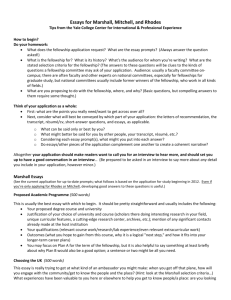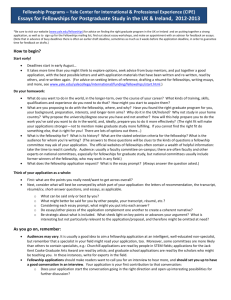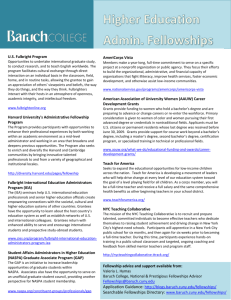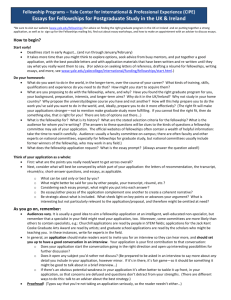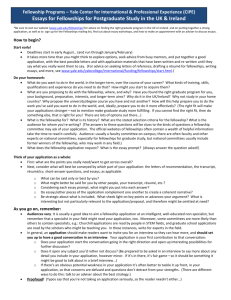Essays for Fellowships for Postgraduate Study in
advertisement
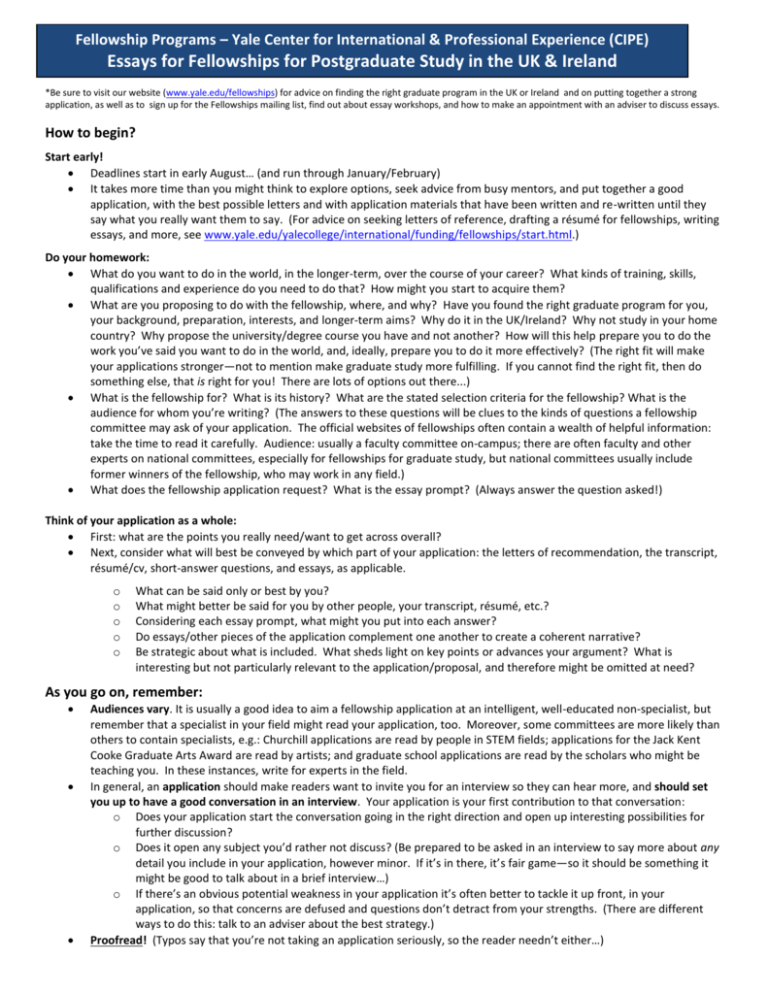
Fellowship Programs – Yale Center for International & Professional Experience (CIPE) Essays for Fellowships for Postgraduate Study in the UK & Ireland *Be sure to visit our website (www.yale.edu/fellowships) for advice on finding the right graduate program in the UK or Ireland and on putting together a strong application, as well as to sign up for the Fellowships mailing list, find out about essay workshops, and how to make an appointment with an adviser to discuss essays. How to begin? Start early! Deadlines start in early August… (and run through January/February) It takes more time than you might think to explore options, seek advice from busy mentors, and put together a good application, with the best possible letters and with application materials that have been written and re-written until they say what you really want them to say. (For advice on seeking letters of reference, drafting a résumé for fellowships, writing essays, and more, see www.yale.edu/yalecollege/international/funding/fellowships/start.html.) Do your homework: What do you want to do in the world, in the longer-term, over the course of your career? What kinds of training, skills, qualifications and experience do you need to do that? How might you start to acquire them? What are you proposing to do with the fellowship, where, and why? Have you found the right graduate program for you, your background, preparation, interests, and longer-term aims? Why do it in the UK/Ireland? Why not study in your home country? Why propose the university/degree course you have and not another? How will this help prepare you to do the work you’ve said you want to do in the world, and, ideally, prepare you to do it more effectively? (The right fit will make your applications stronger—not to mention make graduate study more fulfilling. If you cannot find the right fit, then do something else, that is right for you! There are lots of options out there...) What is the fellowship for? What is its history? What are the stated selection criteria for the fellowship? What is the audience for whom you’re writing? (The answers to these questions will be clues to the kinds of questions a fellowship committee may ask of your application. The official websites of fellowships often contain a wealth of helpful information: take the time to read it carefully. Audience: usually a faculty committee on-campus; there are often faculty and other experts on national committees, especially for fellowships for graduate study, but national committees usually include former winners of the fellowship, who may work in any field.) What does the fellowship application request? What is the essay prompt? (Always answer the question asked!) Think of your application as a whole: First: what are the points you really need/want to get across overall? Next, consider what will best be conveyed by which part of your application: the letters of recommendation, the transcript, résumé/cv, short-answer questions, and essays, as applicable. o o o o o What can be said only or best by you? What might better be said for you by other people, your transcript, résumé, etc.? Considering each essay prompt, what might you put into each answer? Do essays/other pieces of the application complement one another to create a coherent narrative? Be strategic about what is included. What sheds light on key points or advances your argument? What is interesting but not particularly relevant to the application/proposal, and therefore might be omitted at need? As you go on, remember: Audiences vary. It is usually a good idea to aim a fellowship application at an intelligent, well-educated non-specialist, but remember that a specialist in your field might read your application, too. Moreover, some committees are more likely than others to contain specialists, e.g.: Churchill applications are read by people in STEM fields; applications for the Jack Kent Cooke Graduate Arts Award are read by artists; and graduate school applications are read by the scholars who might be teaching you. In these instances, write for experts in the field. In general, an application should make readers want to invite you for an interview so they can hear more, and should set you up to have a good conversation in an interview. Your application is your first contribution to that conversation: o Does your application start the conversation going in the right direction and open up interesting possibilities for further discussion? o Does it open any subject you’d rather not discuss? (Be prepared to be asked in an interview to say more about any detail you include in your application, however minor. If it’s in there, it’s fair game—so it should be something it might be good to talk about in a brief interview…) o If there’s an obvious potential weakness in your application it’s often better to tackle it up front, in your application, so that concerns are defused and questions don’t detract from your strengths. (There are different ways to do this: talk to an adviser about the best strategy.) Proofread! (Typos say that you’re not taking an application seriously, so the reader needn’t either…) Marshall Essays Even if you’re not applying for the Marshall but only for other UK/Irish fellowships, it is useful to develop good answers to these questions. (See the current application for up-to-date prompts; what follows is based on the one for study beginning in 2014.) Proposed Academic Programme (500 words) This is usually the best essay with which to begin. It should be pretty straightforward and usually includes the following: Your proposed degree course and university Justification of your choice of university and course (scholars there doing interesting research in your field, unique curricular features, a cutting-edge research center, archives, etc.—esp. if you’re proposing a popular institution like Oxford, Cambridge, or LSE you’ll want to make a strong, specific case for it); if you’re proposing a research degree and have been in touch with a potential research supervisor who’s expressed interest, mention that Your qualifications (relevant course work/research/lab experience/even relevant extracurricular work) Outcomes (what you hope to gain from this course, why it is a logical "next step," how it fits into your longer-term plans) You may focus on Plan A for the term of the fellowship, but do also say something at least briefly about why Plan B would also be a good option (a sentence or two might be all you need) Ambassadorial Potential “Candidates should describe what “the USA-UK special relationship” means. They should also describe how they might strengthen ties between the USA and the UK in their field of study and through their extra-curricular activities, whilst in the UK and upon their return to the US.” (500 words) This essay is trying to get at what kind of student ambassador you might make in the UK and beyond. Look at the Marshall selection criteria, to see what they’re after. Then think about: When you get off that plane, how will you engage with the community/get to know the people and the place? What experiences have been valuable in the past, to help you get to know people/a new place: are you looking forward to similar things in Britain? If they should give you this extraordinary opportunity, how might you try to give something back to the local community, through volunteer work or other types of community engagement? There might be good professional reasons for studying/making contacts in the UK: don’t assume that these are obvious or that readers will assume you know them. How might you build on these connections in future? (Remember that there’s a whole separate essay for your academic proposal; this essay should not cover that ground again.) *Avoid general arguments for why study abroad is valuable, or about why the history of Britain is important for Americans. Lots of people could (and will) say the same kinds of things—or will write about how they love tea, tweed jackets, Harry Potter, etc. What can you say that someone else might not? Post Scholarship Plan—for a one-year Marshall (500 words) In this essay, you should explain why you can only spend a year in the UK (what’s the important thing you’re going on to do immediately afterwards and why?), how that one year might make a difference (why would having a year to study in the UK contribute to your immediate next step and to your ability to do the work you’ve said you want to in the longer-term?), and how you’ll capitalize on that year (in ways that meet Marshall goals—what kinds of connections do you plan to make? how do you plan to make them in one year? how might you plan to continue those connections in your future life/work?). Complement the Ambassadorial essay. Personal Statements (Often capped at 1,000 words, but see the prompts and word limits for each application, as well as the selection criteria for each fellowship, as these vary a good deal. *Essays for graduate school are not the same as personal statements for fellowships—see “other essays” below.) A “personal” statement is not just about you, but also about the context for the application, what drives you, the work you want to do/the change you want to make in the world, and how what you’re proposing to do with the fellowship might contribute to that/help you to do that better, more creatively, more effectively… Remember that fellowship committees are, in a manner of speaking, looking for a good return on their investment: if they give you this opportunity, what will you do with it and how might that make a positive difference in the world—in ways that meet the goals of the fellowship? This essay should make a persuasive argument for your case. What a personal statement should do: set the context/tone for your application give a clear sense of what you want to do in the world and why someone else might care about it [It’s great if you’re passionate about doing x, but you need more than passion to capture someone else’s interest and persuade a skeptic that this is a) interesting and/or b) work worth doing.] give a clear sense of who you are, what drives you, what has shaped you/your values/your desire to make this proposal and especially your desire to pursue the work you hope to in the world [Beware reciting your résumé! The personal statement should be a compelling, cohesive narrative: if an experience or activity helps make your case, if it explains/illustrates a point, it might fit into the essay; if not, leave it out. Let other parts of the application tell other parts of your story.] be honest: do not pad, but do not be falsely modest; do not try to guess what the selection committee might be seeking and try to give it to them (this will almost certainly not work anyway) [Be yourself: there is no formula for success. While good essays have common features, there are as many different kinds of good essays as there are good applicants. Your application and your essays should represent you!] be a pleasure to read, and well-written [Remember that these essays are often read in bulk, by very busy people…] begin with a “hook” to get readers’ interest and give them an immediate signpost to where the essay is going [Think of a good newspaper article, which draws you in fast, gives you in the first paragraph or so a clear indication of where it might take you, and encourages you to read to the end—but beginning with an anecdote is not required!] Mitchell and Rhodes (and some other) personal statements should include a brief version of the proposed academic program (see above), typically no more than a paragraph. US Rhodes New requirement for 2014: see their website for an important notice about personal statements for the US Rhodes (www.rhodesscholar.org/assets/uploads/2014_Rhodes_Personal%20Essay%20Requirements_1_15_14.pdf). ***This means that you may NOT show drafts of US Rhodes personal statements to anyone. (At least not in order to receive feedback, comments, or any form of advice: drafts may be shared with those writing letters on your behalf, to assist in the writing of a letter, but please make sure that anyone who sees a draft understands that no comments or advice may be shared with you.) For further information see the Yale Student Grants Database (http://studentgrants.yale.edu/); questions may be referred to katherine.dailinger@yale.edu. However, you may—and indeed are strongly encouraged to—talk things over with (Kate and other) advisers and mentors before you begin your draft. Advice on this handout still applies to these essays: with thought, and effort these essays are do-able! Mitchell They’ve introduced the same language as the US Rhodes into their applications beginning in 2014, so the restrictions/advice outlined above also applies to Mitchell applications. Fulbright Since the Fulbright and Marshall programs have very similar aims and most applicants for the UK Fulbright (apart from current PhD students at American universities) propose to pursue a degree course at a British university, the contents of applications for the UK Fulbright and for the Marshall are very similar (see Marshall notes above). Fulbright does require a different arrangement of the material, but there are few hard-and-fast rules about what should go where. Some tips: The Statement of Grant Purpose is, essentially, an expanded Marshall proposed academic programme, with elements (as appropriate) of the essays on “ambassadorial potential” and post-scholarship plan, and even perhaps of the Marshall personal statement. Don’t worry about a timeline or addressing other issues relevant to other Fulbright grant proposals for independent projects: you’re proposing a degree course, which should keep you on track and under the supervision of scholars in your field. Questions of feasibility for the UK Fulbright are more along the lines of: have you proposed the right university and degree course for what you want to do? what resources and opportunities make this exactly the right choice? are you prepared to undertake the proposed graduate work successfully? what are you hoping to get out of your studies in Britain and carry forward into your future work? how might this contribute to the Fulbright goal of fostering mutual understanding? A Fulbright Personal Statement should do the things other personal statements do, giving a sense of who is making the grant proposal and why. Also, if some of the things you’re hoping to do to meet people/foster mutual understanding are unconnected to the academic proposal and professional contacts, they might fit better here. For example, a Biology major hoping to explore cutting-edge research in a particular lab and to make connections to facilitate future international research collaborations should probably include these things in the Statement of Grant Purpose; but if she also loves to sing and hopes to join a choral society, that might fit more naturally into the Personal Statement. Note that there is also a short-answer question about engagement with local community: don’t repeat content, but let different essays complement one another. Gates-Cambridge In addition to notes here (including notes on essays for graduate school, below), see the very helpful Gates website (www.gatescambridge.org/)—don’t miss advice about “the ideal candidate,” the Gates personal statement, choosing the right person to ask to write the Gates reference, etc. Other essays For graduate school applications, especially for postgraduate degree courses in the UK/Ireland: These are not personal statements like those you wrote to get into Yale College or for various fellowships. Graduate schools are not usually looking for wellroundednesss, broad interests, or extracurricular activities. Usually, they want you to cut to the chase and to tell them: why you’re interested in what they have to offer (be specific), what you’re hoping to study (which optional courses interest you, what kind of research you’d like to do, what kinds of questions you’re interested in exploring—tip: it really helps if what you want to study is what they do well) what relevant background and preparation you have for the proposed graduate work (aim this at the people who might be teaching you; relevant extracurricular experience might be included but the focus should be on academic preparation) something of what you’re hoping graduate study might help you to do afterwards Research proposals: There is no better source of advice than from a professor in the appropriate field. Seek advice from your academic mentors at Yale; they may also be able to refer you to helpful colleagues and potential research supervisors… While academic disciplines, word-limits, and other specific requirements differ, the Faculty of English at Cambridge offers an excellent general outline of what should go into any research proposal (www.english.cam.ac.uk/admissions/graduate/research_prop.htm). Resources The Fellowships website, www.yale.edu/fellowships, especially “How to apply” The official website(s) of the fellowship(s) for which you’re applying Campus application information available via the Yale Student Grants Database: http://studentgrants.yale.edu. See policies about academic honesty, deadlines, etc.: www.yale.edu/yalecollege/international/funding/fellowships/policies.html. Information about choosing postgraduate degree courses in the UK and Ireland: www.yale.edu/yalecollege/international/funding/fellowships/ukireland_resources.html Advice from past Yale applicants: www.yale.edu/yalecollege/international/funding/fellowships/interview_reports_advice.html Writing Personal Statements by Joe Schall: www.e-education.psu.edu/writingpersonalstatementsonline/ Lots of sites offer great advice to applicants—some examples (with thanks!): o Reed College: http://people.reed.edu/~brashiek/Rhodes-Marshall/index.html o Stanford University: http://icenter.stanford.edu/orc/Handouts/General%20Application%20Guide.pdf; http://icenter.stanford.edu/orc/Handouts/RM_4_Interviews.pdf o Willamette University: www.willamette.edu/dept/saga/applicationprocess/index.html o Worcester Polytechnic Institute: www.wpi.edu/Academics/FS/consider.html *About sample essays Have a serious try at writing your own first draft before looking at samples—it can be very hard to hear what you have to say when other people’s voices are in your ear. The US Rhodes strongly discourages students from looking at samples at all. There are sample essays available to read in the Fellowships office (just ask) or online [e.g. in chapter 5 of Joe Schall’s Writing Personal Statements, on the Fulbright website and elsewhere]. People from whom you might seek advice about essays Kate Dailinger, adviser for UK and Irish fellowships at CIPE: see www.yale.edu/fellowships for how to make an appointment to discuss essays (in person or via Skype/telephone). At seasons of high demand, appointments fill up weeks in advance of a campus application deadline… Trusted mentors and/or those writing your letters of reference (not only will their advice help you, but talking things over with you makes it easier for them to write stronger, more specific letters of reference). Forward planning is essential! College Writing Tutors and the Yale College Writing Center: http://writing.yalecollege.yale.edu/ Graduate Fellowship Affiliates (www.yale.edu/yalecollege/international/funding/fellowships/gfa.html) and other past winners of fellowships But don’t forget: this is your application, and should be your own work and say what you have to say! Note 2014 changes to US Rhodes and Mitchell competitions: any conversations about subjects relating to personal statements must take place before you embark on drafts. The final word: proofread! (Really. Even at the campus application stage. In tough competitions, small things can make a big difference and typos can distract from the interesting things you have to say. If it’s permitted, have someone who hasn’t already read your application a million times proofread for you, too…) Fellowship Programs – Yale College CIPE - www.yale.edu/fellowships This handout last revised May, 2014.
